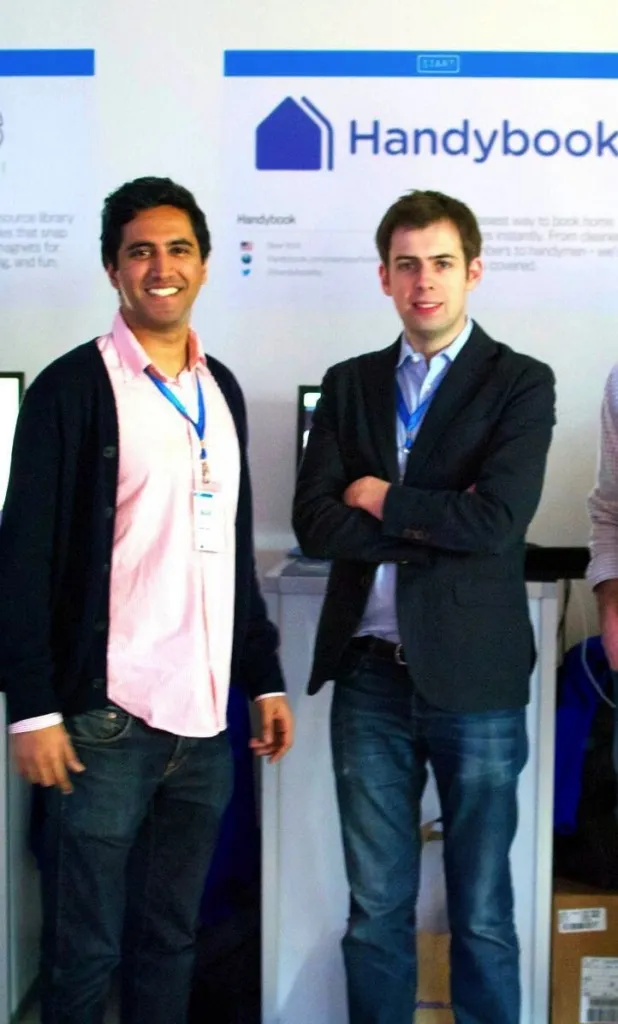Dropping out of Harvard Business School to startup: The Story behind Handybook
Handybook is a part of the series of startups we're covering under "Silicon Bridge" which puts focus on startups which have a India-US connect.

If entrepreneurship is about solving a problem, Handybook, the brainwave of Umang Dua and Oisin Hanrahan, takes that to the heart. The startup, which enables online booking of ‘handy’ services from cleaning to plumbing to painting, is spreading fast in New York, Boston and San Francisco.
In conversation here, with co-founder Umang Dua, on what motivated the duo to quit Harvard Business School to pursue this dream.
The motivation to startup
While the urge to startup, especially when you are at B-school, is understandable, not many would quit the prestigious Harvard Business School to pursue the dream. What was the conviction, we ask Umang. “The decision to drop out of Harvard wasn't an easy one. I really liked the place and there were so many amazing people at HBS. While most people thought I was crazy to drop out, and the thought was scary for me as well, I just felt running a startup isn't the sort of thing you can do part time. You're either all in or not," says Umang. But was the decision based completely on idealism? Surely, it wasn't. The duo had launched Handybook while still at B-school and when the business started to get traction, and they saw the potential to build something big, they decided it deserved their unwavering attention.
While starting up was a big decision, their motivation behind that was simpler - ‘the fascination of being able to take something from an idea to a real business that people can actually use’.
The idea can be really simple, it is the execution that matters
Handybook is based on a really simple idea. Booking services online, whether it’s cleaning or a painting/plumbing job, people don't know who is reliable, when and where are the services available and what is the right price to pay. “While services such as flights, hotel, cabs etc. rely heavily on online bookings, handymans' services are still stuck in the 20th century”, says Umang. Like most startups aiming to solve a problem, for the founders of Handbook, ‘the problem began at home’ when they struggled to get their own apartment cleaned, while at B-school.
The aim of Handybook though is beyond merely addressing a problem. They aspire to become the ‘simplest, quickest and most reliable way’, to book all kinds of household services in the US. Handybook simplifies the process by screening the potential service providers, gets their availability, and set the prices. Their technology offers a platform to book the services, either online or through their mobile app, all in under 60 seconds.
The team currently has 10 people (which they plan to double in the next 3-4 months), close to 300 service providers already registered on the platform and over 15,000 applications from service providers wanting to get listed!
Having investors on board early on
For a year old startup, Handybook already has an impressive investor backing and some brilliant minds on their board. Umang says it was a conscious choice to approach investors early on. “Even before we were actually looking to raise capital, we started talking to investors and building relationships. This gives people time to track your progress, and get to know the team a little better”, says Umang. The factors that helped them clinch the deal early on were the market size, the advantage of being an early player, and that their product was processing transactions and generating cash from day one. “Nothing convinces investors more that showing a real product with real customers”, says Umang, matter-of-factly.
The startup has been funded by VCs, Highland Capital Partners, General Catalyst Partners (who’ve made early investments in companies like Kayak and Airbnb) and angel investors including David Tisch (the founder of TechStars in New York). Their Board boasts of names like Bob Davis, the founder and CEO of Lycos, the company that has had the fastest IPO in Nasdaq history and Joel Cutler, the founder of General Catalyst Partners.
‘A product that speaks for itself’ is the best marketing
Speaking of marketing, Umang says, they do a combination of online and offline promotions. But it is the referrals, according to Umang, that have so far been their biggest source of customer acquisition. “As long as we keep doing a good job, we hope people will keep spreading the word and doing our marketing for us”, he concludes.
Handybook which currently offers its services In New York, Boston and San Francisco is planning is to open up its services across 5-6 other cities in the US, in the next few months.
While Handybook is looking at spreading its wings in the US, in the last months we have also seen startups in India like, MyPeon, Hammer&Mop, EasyFix, Clean Fanatic and TheekKarDo, who are employing similar models. Businesses like these, that are relevant to the times we live in, if executed well, will definitely find acceptance. While they have caught the right pulse of the client, their main challenge remains an unorganized sector and a large number of unreliable service providers, which they need to tackle effectively.
Website: Handybook
Techsparks 2013, the largest technology product startup recognition platform of India KickStarts on May 18. Join us for this 7 city startup extravaganza!







